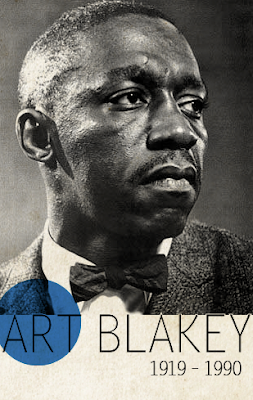Our first special will be for a very special artist, who believed always in youngsters, as he said.
In our player will be some music from Art.
Art Blakey (1919 - 1990) recognized for playing drums, he was one of the inventors of modern bebop drumming style.
Also he was a bandleader, and with his band (The Jazz Messengers) he included several new talents who later became known and respected names in jazz.He started playing piano full-time and later he was seduced by drums, and he taught himself to play the drums in the aggressive swing style of Chick Webb, Sid Catlett and Ray Bauduc.
He joined Mary Lou Williams as a drummer for an engagement in New York in autumn 1942. He then toured with the Fletcher Henderson Orchestra (1943 – 1944). During his years with Billy Eckstine’s big band (1944 – 1947) Blakey became associated with the modern-jazz movement, along with his fellow band members Miles Davis, Dexter Gordon, Fats Navarro and others.
Later Blakey organized the Seventeen Messengers, a rehearsal band, and recorded with an octet called The Jazz Messengers
The most celebrated of these early records (credited to "The Art Blakey Quintet"), is A Night at Birdland from February 1954, one of the earliest commercially released "live" jazz records.
This featured Silver, Blakey, the young trumpeter Clifford Brown, alto saxophonist Lou Donaldson and bassist Curly Russell.
The "Jazz Messengers" name was first used on a 1954 recording nominally led by Silver, with Blakey, Hank Mobley, Kenny Dorham and Doug Watkins — the same quintet would record The Jazz Messengers at the Cafe Bohemia the following year, still as a collective.
Donald Byrd replaced Dorham, and the group recorded an album called simply The Jazz Messengers in 1956. Blakey took over the group name when Silver left after the band's first year (taking Mobley, Byrd and Watkins with him to form a new quintet with a variety of drummers), and the band was known as "Art Blakey and the Jazz Messengers" from then onwards.
From 1959 to 1961 the group featured Wayne Shorter on tenor saxophone, Jymie Merritt, Lee Morgan, and Bobby Timmons. The second (1961–1964) was a sextet that added trombonist Curtis Fuller and replaced Morgan and Timmons with Freddie Hubbard and Cedar Walton, respectively.
Shorter was the musical director of the group, and many of his original compositions such as "Lester Left Town" remained staples of Blakey's repertoire even after Shorter's departure. Shorter's more experimental inclinations pushed the band at the time into an engagement with the 1960s "New Thing", as it was called: the influence of Coltrane's contemporary records on Impulse! is evident on Free For All (1964), often cited as the greatest document of the Shorter-era Messengers (and certainly one of the most fearsomely powerful examples of hard bop on record)

Blakey went on to record dozens of albums with a constantly changing group of Jazz Messengers — he had a policy of encouraging young musicians: as he remarked on-mike on A Night at Birdland (1954): "I'm gonna stay with the youngsters. When these get too old I'll get some younger ones. Keeps the mind active."
After weathering the fusion era in the 1970s with some difficulty (recordings from this period are less plentiful and include attempts to incorporate instruments like electric piano), Blakey's band got revitalized in the early 1980s with the advent of neotraditionalist jazz. Wynton Marsalis was for a time the band's trumpeter and musical director, and even after Marsalis's departure Blakey's band continued as a proving ground for many "Young Lions" like Terence Blanchard, Donald Harrison and Kenny Garrett.
Blakey continued performing and touring with the group into the late 1980s, and he died in 1990 of lung cancer in New York City, leaving behind a vast legacy and approach to jazz which is still the model for countless hard-bop players.
October 16 2010 will be the 20th anniversary of his death.
Keep drummin' Blakey! Keep drummin'





0 comentarios:
Publicar un comentario